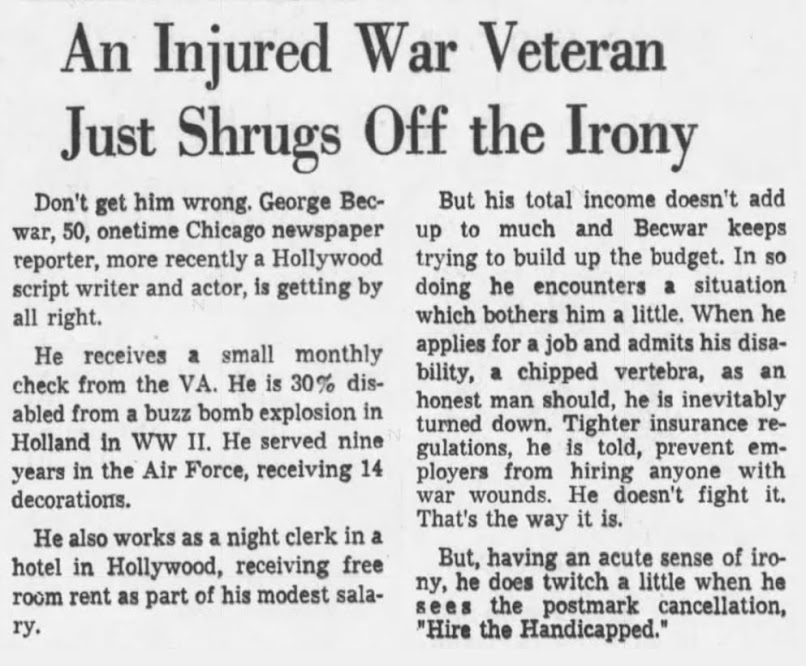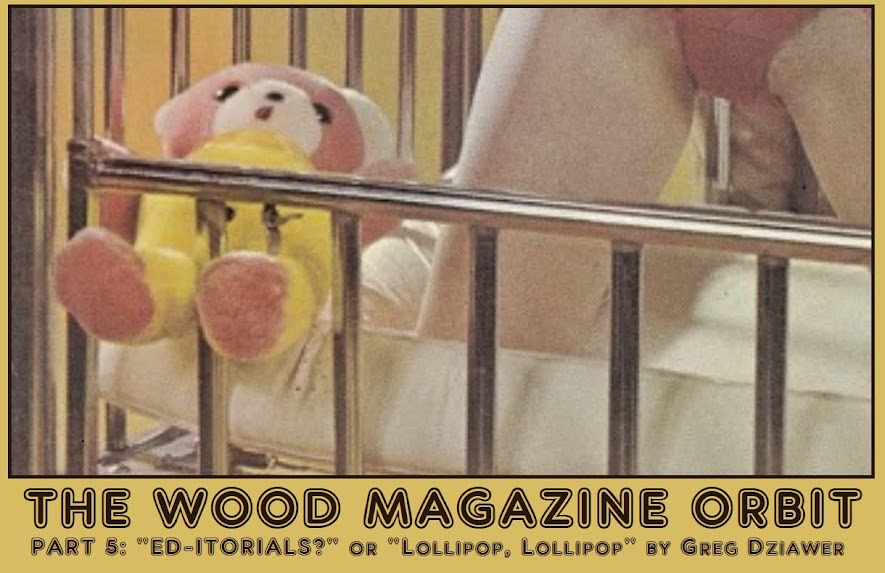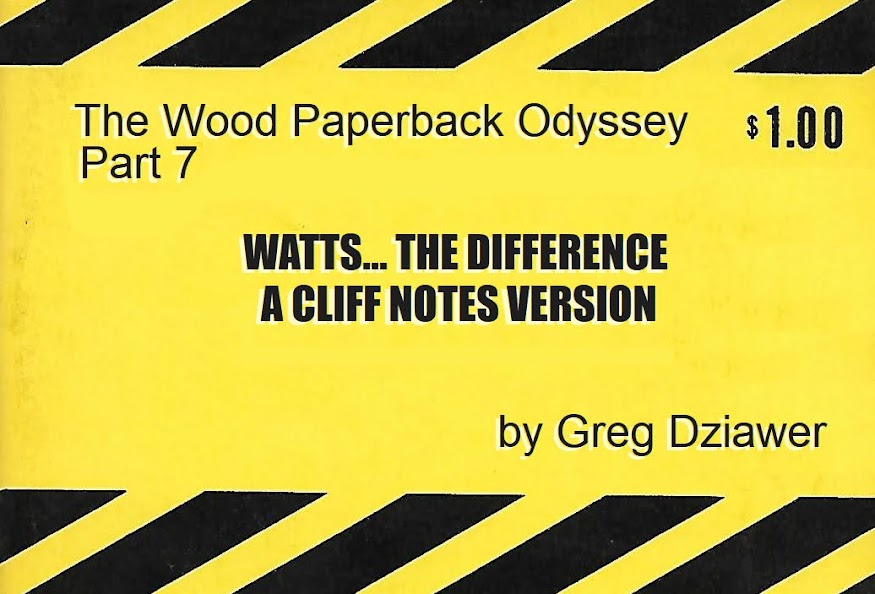 |
| This week, we examine the life and legacy of George J. Becwar. |
If there's a scene people remember from Ed Wood's Bride of the Monster (1955), it's the one in which Bela Lugosi delivers his heart-wrenching "Home! I have no home!" speech. The emotional monologue looms so large in B-movie mythology that Tim Burton had Martin Landau, portraying an aged Lugosi, recite it twice in the biopic Ed Wood (1994): once while on the set of Bride and once while walking down the street with Ed. The latter performance attracts a crowd of appreciative onlookers, much to Lugosi's satisfaction. The biopic presents this moment as the old actor's last taste of glory before his death.
 |
| Lugosi and Becwar in Bride of the Monster. |
But Lugosi's character in Bride, tortured mad scientist Dr. Eric Vornoff, would have had no reason to make such a tear-jerking speech if it hadn't been for good old George Becwar. It's Becwar, as duplicitous foreign agent Prof. Strowski, who provokes the emotional outburst by offering to take Vornoff back to the country from which the scientist had previously been exiled.
"Vornoff," he says in a passable Eastern European accent, "I have searched for you everywhere. Everywhere I hear stories of monsters. Now I am here, sent to bring you home." And from there, Lugosi is off to the races.
Strowski may not be the most glamorous assignment ever given to an actor—the Mystery Science Theater 3000 crew dismissed him as a "worthless ancillary character waiting to be killed off"—but Becwar at least manages to turn him into a pompous villain deserving of our contempt. Thus, it's quite satisfying when Vornoff's henchman Lobo (Tor Johnson) feeds Strowski to a ravenous octopus. Becwar, bless him, remains defiant to the end: "You may kill me, but others will come!"
If actor John Andrews is to be believed, Ed Wood and George Becwar did not exactly have a cozy working relationship during the making of Bride. As he told Rudolph Grey in Nightmare of Ecstasy (1992): "Eddie hated, loathed, despised, wanted murdered, I'm not overdoin' it, man, I'm tellin' you straight—George Becwar." Allegedly, Becwar was dissatisfied with his pay for Bride of the Monster and reported Ed to the Screen Actors Guild. According to John Andrews, Ed Wood held a grudge for the rest of his days against Becwar. Notably, the two never worked together again.
George Jerome Becwar was born on September 16, 1917 in Berwyn, IL a suburb of Chicago. (Yes, the same town mentioned each week on MeTV's Svengoolie.) At Harrison Technical High School, he was a Cadet Major in the ROTC. In 1941, George was drafted by the army and enlisted in the 131st Infantry. His draft card yields some interesting biographical information. He was 23 at the time, living in Chicago and working for the Illinois Writers Project, which was sponsored by the WPA. He lists his mother as his next of kin. For what it's worth, the back of the card describes Becwar as standing 5'10" and weighing 240 pounds with brown hair, brown eyes, and a ruddy complexion. He is said to have worn glasses. The card also notes that he had several scars: one on his left hand, another under his right nostril, and a third at the base of his spine.
 |
| George Becwar's draft card. |
From the mid-1950s to the early '60s, George had the honor of calling himself a working actor in Hollywood, popping up in at least 14 known television series and seven films. These were not always obscure, low-budget projects either! Remember the CBS Western The Rebel with Nick Adams? ("Johnny Yuma was a rebel! He roamed through the West!") George was on it seven times -- as seven different characters! He's in A Star is Born, too, specifically the 1954 version with Judy Garland and James Mason. Baby boomers may still have fond memories of such black-and-white series as Death Valley Days, Sky King, Highway Patrol, and I Led 3 Lives. All of them hired George Becwar, some on multiple occasions.
After he got to Hollywood, Becwar had his share of misadventures as an actor. The March 31, 1952 issue of The Los Angeles Evening Citizen News shares the "humorous" story of how he was briefly mistaken for a thief.
 |
| "Surely, this is not a laughing matter." |
In addition to being an actor, Becwar was also civic-minded. The January 3, 1958 issue of The (Los Angeles) Mirror News includes his letter to the editor concerning automobile safety. This letter is not terribly fun, so I suggest you read it aloud in your best Prof. Strowski voice.
 |
| George Becwar has a plan. |
Los Angeles Times columnist Matt Weinstock wrote about George Becwar a few times. This article from December 15, 1966 gives us yet more background information about the actor, including his past as a journalist and his war injuries. It also fills us in what Becwar did for money between roles, i.e. working as a hotel clerk and doing some writing on the side.
 |
| George Becwar was 30% disabled. Who knew? |
Another column by Matt Weinstock in the February 9, 1969 issue of The Los Angeles Times yields an intriguing anecdote about Becwar and fills in some details about the actor's past. We learn, for instance, that Bride of the Monster was not the only time George raised a stink about his pay. The article also suggests that the actor had a couple of upcoming movies for producer Martin Zessin. In fact, George's screen acting career basically dried up after 1961. After an absence of eight years, his last-known screen credit is a totally forgotten 1969 film called The Great Sex War, in which he played Gen. Caleb Sutton. This comedy may never have been released, despite the fact that its cast included such well-known actors as James Franciscus, George Raft, and Cantinflas. We were denied a tagline like: "Becwar! Sex War! See it this Christmas!"
 |
| As always, George was concerned about his pay. |
Other brief mentions of George Becwar in the press (apart from the mere inclusion of his name in cast lists):
- The Los Angeles Evening Citizen News, March 18, 1953: George is listed as the stage manager of an Equity house at 6040 Wilshire Blvd. where auditions are being held for a two-act musical comedy.
- The Los Angeles Evening Citizen News, March 25, 1953: A brief item declares that "critics have lauded" the performances of Becwar and his castmates in a play called Outward Bound, which was then in its second week at the Gallery Theater on Santa Monica Blvd.
- The Los Angeles Evening Citizen News, November 12, 1953: Richard Lipscomb's review of Outward Bound declares that Becwar is among the "promising talent" in the show.
- The Los Angeles Evening Citizen News, February 16, 1955: A showbiz column called "In the News" declares that Becwar has signed "with Paul Kohner Agency for radio, movies and television."
- The Los Angeles Evening Citizen News, January 18, 1956: "In the News" says that Becwar has won a television role as a Czech police chief in The Man Called X.
 |
| "An important role" for George Becwar. |
- The Los Angeles Times, January 28, 1956: A one-paragraph article in the entertainment section notes that Becwar "enacts an important role in Bride of the Monster." The film is said to be accompanying Ransom! (1956) at various theaters and drive-ins.
- The Los Angeles Evening Citizen News, January 18, 1957: "In the News" notes that George has signed with the Swoverland Agency.
- The (Palm Springs) Desert Sun, July 3, 1957: Columnist Mike Connolly notes that Becwar was hired "at the last minute" to appear in an installment of Playhouse 90 entitled "The Fabulous Irishman." According to Connolly, the hapless actor "stayed up all night working up an Irish brogue," only to find that his character was an Englishman.
- The Los Angeles Evening Citizen News, August 29, 1959: George is declared the winner of that week's "Name the Stars of Tomorrow" contest. His prize is a Westclock wrist watch. His address is given as 616 N. Gower St.
- The Los Angeles Evening Citizen News, June 28, 1960: "In the News" reports that George is playing three roles in the play Liliom at a venue called The Theater but he's soon leaving the company "to meet TV commitments."
- The Los Angeles Times, July 4, 1960: In his review of Liliom, critic Charles Stinson mentions being impressed by Becwar's performance as "the lecherous and pompous police captain."
- The Los Angeles Evening Citizen News, April 2, 1963: The "All About People" column notes that Becwar has returned to Hollywood "after seven months of radio work in Las Vegas." He is said to be in rehearsals for a play called Not to Speak Profanely. His address is given as 1764 N. Orange Dr.
- The Los Angeles Evening Citizen News, February 15, 1967: Another of George's letters to the editor. This time, Becwar opines: "Students at both the University of California and the California State Colleges can easily meet Gov. Ronald Reagan's tuition charges by using the money they used to spend on haircuts." Zing!
Sadly, George Becwar's life was even shorter than that of Ed Wood. The Illinois-born actor passed away at the age of only 52 on July 9, 1970, having never married nor had children. George's body was sent back to his home state and buried at a Catholic cemetery in suburban Cook County. A modest obituary appeared in the July 13, 1970 edition of The Chicago Tribune.
 |
| "Sent to bring you home": George Becwar's obituary. |
CONCLUSION: George Becwar played a fleeting but not insignificant role in the saga of Edward D. Wood, Jr. It may never occur to most viewers to ask who this man was, where he came from, or where he went after Bride of the Monster. As it turns out, however, George had a pretty fascinating and multifaceted life. Was he a pain in the ass? Maybe. But at least he got to take part in one of the most famous scenes in any of Ed Wood's movies, and it's earned him an odd sort of immortality.









